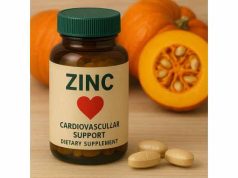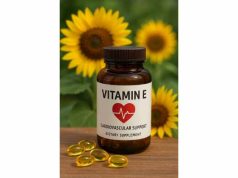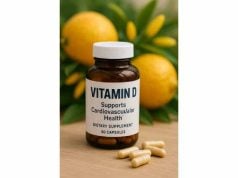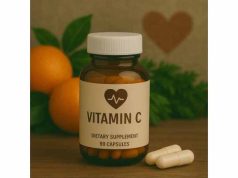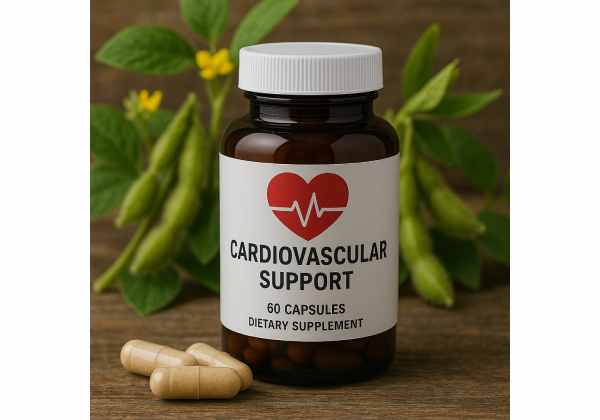
Genistein is gaining substantial recognition as a noteworthy isoflavone that may help bolster cardiovascular function and reduce the likelihood of heart-related complications. Found primarily in soy products and certain legumes, Genistein exhibits antioxidant, anti-inflammatory, and lipid-modulating actions, all of which contribute to better heart wellness. Researchers have long been intrigued by its potential influence on blood pressure regulation, arterial resilience, and overall circulatory performance. In this thorough guide, we will delve into how Genistein for Heart Health might support balanced cholesterol levels, enhanced vascular function, and strategies to prevent cardiovascular disease. Read on to uncover how this versatile compound works and what science has to say about its cardioprotective properties.
Table of Contents
- Comprehensive Insight into Genistein for Heart Health
- How Genistein Operates: Fundamental Biochemical Interactions
- Scientific Validation of Genistein’s Cardioprotective Role
- Practical Guidance on Dosage, Usage, and Safety
- Frequently Asked Questions
- References and Sources
Comprehensive Insight into Genistein for Heart Health
Genistein is a naturally occurring isoflavone predominantly found in soybeans, chickpeas, and other legumes. Classified as a phytoestrogen due to its structural similarity to human estrogen, Genistein influences various physiological processes, particularly those tied to hormonal balance and cellular signaling. In traditional East Asian diets, which are rich in soy-based foods, Genistein consumption is significantly higher than in Western dietary patterns. This contrast has spurred extensive research, much of it focused on Genistein’s role in heart health and longevity.
Understanding the Core Properties
- Phytoestrogenic Action: As a plant-based compound with mild estrogenic properties, Genistein can selectively bind to estrogen receptors. This function may modulate lipid metabolism, vascular integrity, and inflammatory processes.
- Antioxidant Potency: Genistein is known to scavenge harmful free radicals, thereby mitigating oxidative damage to cells and tissues, including those of the heart and arterial linings.
- Anti-Inflammatory Traits: Chronic inflammation contributes to plaque buildup and vascular stiffness. Genistein’s capacity to reduce key markers of inflammation can translate into better arterial flexibility.
- Lipids and Blood Pressure: Numerous studies suggest that diets high in Genistein-containing foods or supplements can enhance lipid profiles and potentially modulate blood pressure readings.
Why Focus on Genistein for Cardiovascular Wellness?
Heart-related ailments remain a leading cause of mortality worldwide. Strategies for prevention commonly emphasize dietary modifications, exercise, and stress management. The unique advantage of Genistein for Cardiovascular Health lies in its multidimensional impacts:
- Cholesterol Regulation: It may influence both “bad” LDL and “good” HDL cholesterol in favorable ways.
- Endothelial Support: By promoting nitric oxide availability, Genistein helps maintain healthy vessel tone and blood flow.
- Hormonal Balance: Postmenopausal women and other populations experiencing hormonal fluctuations might see improvements in risk factors when they incorporate phytoestrogens like Genistein into their daily routine.
Food Sources and Supplementation Options
- Soy Foods: Tofu, tempeh, edamame, miso, and soy milk are rich in Genistein. In these forms, it often works in synergy with other isoflavones, such as daidzein.
- Legumes: Though less concentrated than soy, chickpeas and other beans contain modest amounts of Genistein.
- Supplements: These are typically available in capsule or tablet forms. Some products combine Genistein with additional beneficial components like resveratrol or vitamins.
- Fortified Products: Cereals, protein shakes, or nutrition bars may be enriched with soy isoflavones for convenience.
Research into Genistein’s heart-protective capabilities has prompted manufacturers to refine extraction methods, ensuring consistent potency and purity. Yet, the real question remains: how does Genistein actually work inside the body to deliver these potential advantages? Let’s explore the fundamental biochemical pathways in the next section.
How Genistein Operates: Fundamental Biochemical Interactions
To appreciate why Genistein Benefits for Heart Health are so frequently discussed, it’s essential to comprehend the molecule’s mechanisms at the cellular and molecular levels. Genistein exerts its physiological effects through several interrelated pathways, involving hormone receptor modulation, antioxidant defense, and enzyme inhibition.
1. Phytoestrogenic Dynamics
Genistein is structurally similar to estradiol, enabling it to bind to estrogen receptors in the body—particularly estrogen receptor beta (ER-β). While its affinity for these receptors is lower than that of estradiol, even partial binding can influence gene expression tied to lipid metabolism and vascular function.
- ER-Dependent Gene Regulation: Once attached to an estrogen receptor, Genistein may activate or suppress specific genes related to cholesterol production, inflammatory cytokines, and other cardiovascular variables.
- Selective Modulation: Unlike synthetic estrogens, Genistein often operates as a selective estrogen receptor modulator (SERM), meaning it can either mimic or block estrogen’s actions depending on the tissue context.
2. Enzyme Inhibition and Cardiac Health
Beyond its estrogenic properties, Genistein is known to inhibit multiple enzymes that play key roles in cellular signaling. These include:
- Tyrosine Kinases: Crucial in regulating cell growth, proliferation, and differentiation. Overactivation of tyrosine kinases can fuel pathological processes, such as unchecked smooth muscle cell proliferation in artery walls.
- LDL Oxidation: While not an enzyme inhibition per se, Genistein’s antioxidant capacity can slow the oxidation of LDL cholesterol, a critical step in atherosclerotic plaque formation.
3. Support for Nitric Oxide Synthesis
Healthy nitric oxide (NO) production is pivotal in sustaining flexible blood vessels and preventing excessive platelet aggregation. Genistein’s interplay with endothelial cells may foster improved NO availability, leading to:
- Enhanced Vasodilation: Vessels can more effectively dilate, supporting stable blood pressure.
- Reduced Endothelial Dysfunction: Less inflammation and oxidative stress help preserve the protective barrier of the arterial wall.
- Less Thrombotic Activity: Proper NO levels discourage platelet clumping, which can lower the risk of dangerous blood clots.
4. Inflammatory Cascade Regulation
Chronic inflammation drives the progression of many heart conditions. Genistein’s ability to moderate inflammatory signals emerges from its effects on:
- Cytokine Production: Pro-inflammatory cytokines like TNF-α and IL-6 can be reduced when Genistein is present at therapeutic levels.
- COX-2 and NF-κB Pathways: Some evidence suggests Genistein can downregulate these pathways, both of which are integral to inflammatory states and tissue damage.
5. Lipid and Glucose Metabolism
By activating or inhibiting certain transcription factors (e.g., PPARs), Genistein may indirectly regulate fat and glucose metabolism. This function is vital for individuals with or at risk for metabolic syndrome, as better metabolic control often correlates with improved cardiovascular outcomes.
- Fatty Acid Oxidation: Genistein can encourage the breakdown of fats and reduce unhealthy accumulation in tissues.
- Insulin Sensitivity: Some studies point to enhanced insulin sensitivity with regular isoflavone intake, supporting balanced blood sugar levels that, in turn, protect vascular health.
6. Potential Synergy with Other Nutrients
Genistein often interacts synergistically with additional bioactive compounds:
- Other Isoflavones: When combined with daidzein or glycitin (other soy isoflavones), the overall effect on lipid profiles or inflammatory markers might exceed the sum of individual components.
- Antioxidants: Vitamins C and E, or polyphenols like resveratrol, may reinforce Genistein’s antioxidant potential.
- Co-Enzymes and Minerals: Adequate magnesium, zinc, or selenium status can further enhance the protective effect of Genistein on cardiovascular tissues.
By blending these intricate pathways—hormonal modulation, enzyme inhibition, antioxidant and anti-inflammatory functions—Genistein can help cardiovascular function in multiple ways. In the next section, we will examine concrete, evidence-based insights showing how this isoflavone has performed in controlled trials and observational research, clarifying its place in heart health strategies.
Scientific Validation of Genistein’s Cardioprotective Role
Genistein’s reputation as a heart-friendly compound stems not just from theoretical mechanisms but also from an accumulating body of empirical research. Human trials, epidemiological surveys, and laboratory experiments provide insight into how Genistein for Cardiovascular Health might translate into meaningful reductions in disease risk.
1. Human Clinical Trials on Cholesterol and Lipids
- LDL and Total Cholesterol: Multiple studies on postmenopausal women and hypercholesterolemic patients suggest that isoflavone supplements containing Genistein can reduce LDL levels. The magnitude of reduction varies, but a consistent trend of improved lipid profiles emerges in these investigations.
- HDL Support: In some trials, participants also showed slight increases in HDL (“good” cholesterol). While changes in HDL are not always dramatic, even modest shifts can foster better heart health over the long haul.
- Triglycerides: Results on triglyceride modification are mixed, with some studies noting small improvements, whereas others detect no significant alteration. The combination of Genistein with lifestyle interventions, like diet and exercise, may yield more pronounced benefits.
2. Blood Pressure Findings
High blood pressure is a major contributor to cardiovascular disease. By promoting arterial flexibility and nitric oxide production, Genistein offers a promising avenue for stabilizing blood pressure:
- Reduction in Systolic and Diastolic Pressure: In certain randomized trials, individuals taking soy isoflavone supplements exhibited decreases in both systolic and diastolic blood pressure values.
- Synergy with Other Nutrients: Studies that paired Genistein with magnesium or potassium reported superior blood pressure improvements compared to Genistein alone.
- Population-Specific Benefits: Adults with borderline or mildly elevated blood pressure seem most responsive to isoflavone supplementation; those already on antihypertensive medication should consult medical professionals for integrated strategies.
3. Vascular Health and Atherosclerosis
Atherosclerosis, the gradual buildup of plaque in arterial walls, leads to reduced blood flow and heightened risk of heart attacks or strokes. Research on Genistein’s influence includes:
- Coronary Artery Calcification: Some observational data link isoflavone-rich diets with a slower progression of calcification in coronary arteries, though randomized controlled trials in this domain remain limited.
- Endothelial Function Enhancement: Flow-mediated dilation tests (FMD) demonstrate that Genistein supplementation may boost endothelial responsiveness, signifying healthier blood vessels.
- Plaque Stability: By curtailing oxidative and inflammatory signals within the plaque, Genistein could potentially bolster plaque stability and lower the probability of rupture.
4. Anti-Inflammatory and Antioxidant Validation
Chronic inflammation—manifested through elevated C-reactive protein (CRP) and other markers—aggravates heart disease risk. Genistein has shown promise in:
- Lower CRP and IL-6: Certain interventional studies involving isoflavone supplements observed statistically meaningful drops in CRP and interleukin-6 among participants who used Genistein regularly.
- Reduced LDL Oxidation: By limiting oxidative stress, Genistein decreases the formation of oxidized LDL, a key precursor to plaque accumulation in arteries.
5. Menopause, Hormonal Factors, and Heart Health
Menopausal women lose the protective effects of endogenous estrogen, escalating their vulnerability to cardiovascular disease. Genistein’s partial estrogenic action may offset some negative consequences:
- Improved Lipid Balance: Postmenopausal women often witness unfavorable shifts in LDL, HDL, and triglycerides. Isoflavone interventions, particularly with Genistein, can help restore more favorable lipid levels.
- Bone Density and Weight Management: Although primarily linked to osteoporosis prevention, better bone density and stable body weight indirectly support cardiac health.
6. Insights from Population Studies
Regions with higher dietary soy intake, such as certain East Asian communities, historically exhibit lower rates of cardiovascular conditions. While genetics, physical activity, and other factors also come into play, the correlation has spurred global interest in Genistein’s role:
- Lifestyle Implications: Nutrient-rich diets, especially those abundant in vegetables, fruits, and legumes, may magnify Genistein’s protective potential.
- Longitudinal Observations: Larger prospective cohorts reinforce the link between consistent soy consumption and diminished CVD incidence, underscoring the potential benefits of isoflavones over a lifetime.
While a robust body of evidence supports the notion that Genistein Helps Cardiovascular Function, results can vary based on factors like individual genetics, baseline health status, dosage levels, and the presence of other lifestyle elements. In the next section, we will explore dosage recommendations, usage guidelines, and safety precautions to ensure that those interested in Genistein’s heart advantages can do so responsibly.
Practical Guidance on Dosage, Usage, and Safety
Before integrating Genistein into your wellness routine, it’s crucial to acknowledge both its potential and any associated considerations. This section provides a comprehensive overview of how to determine a suitable dosage, the forms in which Genistein is available, and the safety measures important to reaping its full benefits.
Selecting the Ideal Genistein Form
- Dietary Sources
- Soy-Derived Foods: Tofu, tempeh, soy milk, miso, and edamame are prime options for naturally ingesting Genistein. Aim for non-GMO, minimally processed variants to preserve isoflavone content.
- Legumes and Grains: While soy is the richest supply, chickpeas, peanuts, and certain grains can also deliver smaller amounts of Genistein.
- Broader Plant-Based Diet: A diet abundant in produce, whole grains, and legumes can complement Genistein’s roles by providing additional micronutrients and antioxidants.
- Supplement Forms
- Isoflavone Capsules or Tablets: Typical isoflavone products may list total isoflavones, often including Genistein, daidzein, and glycitin. Look for standardized extracts that specify the amount of Genistein in milligrams.
- Protein Powders: Some soy protein supplements highlight their isoflavone concentration, enabling convenient addition to smoothies or recipes.
- Combination Formulas: Certain heart-health supplements pair Genistein with other nutraceuticals (like CoQ10, resveratrol, or omega-3s) for a synergistic effect.
Determining the Right Dosage Range
- General Dietary Intake: Individuals in East Asian populations who regularly eat soy can consume 20–50 mg or more of Genistein daily. This range often serves as a benchmark for healthy intake.
- Supplement Guidelines: Many isoflavone supplements offer 30–100 mg of Genistein per serving. Studies examining heart health sometimes use daily intakes of up to 100 mg or slightly higher.
- Stepwise Adjustment: If you’re new to isoflavones, begin with a lower dosage (e.g., 30 mg/day) and gradually scale upward, monitoring your body’s response and consulting a healthcare provider if needed.
Timing and Absorption
- With Meals: Consuming Genistein alongside moderate dietary fat can improve its absorption since isoflavones are somewhat lipophilic.
- Split Doses: Dividing the total daily dose into two or three smaller portions might maintain steadier levels of active compounds in the bloodstream.
- Synergistic Nutrients: Pair Genistein with vitamin C–rich foods or other antioxidants to enhance its protective effects against oxidative damage.
Potential Side Effects and Interactions
Genistein is generally considered safe when consumed as part of a standard diet or used responsibly in supplement form. Nonetheless, certain caveats exist:
- Hormone-Sensitive Conditions: Individuals with estrogen-receptor-positive cancers or a family history of hormone-sensitive tumors should consult a qualified medical professional before taking high doses of Genistein.
- Pregnancy and Breastfeeding: While moderate soy intake is customary in various cultures, pregnant or nursing women should seek medical guidance regarding concentrated isoflavone supplements.
- Thyroid Function: Excessive soy intake might influence thyroid hormone activity in susceptible individuals. If you have a history of thyroid imbalance, monitor your hormone levels and discuss supplement usage with a healthcare provider.
- Allergic Reactions: Some individuals experience soy or legume allergies. Watch for hives, itching, swelling, or respiratory symptoms after consumption.
- Drug Interactions: Genistein’s mild estrogenic effects and possible influence on enzyme systems mean that it might interfere with certain medications, including hormone therapies or thyroid meds.
Who Should Consider Genistein?
- Postmenopausal Women: Genistein’s phytoestrogenic properties can offer benefits for both bone and cardiovascular health during the menopausal transition.
- Individuals with Borderline Cholesterol or Blood Pressure: In conjunction with dietary and lifestyle adjustments, Genistein could help optimize lipid and blood pressure values.
- Vegetarians and Vegans: Plant-based eaters often rely on soy protein, naturally high in Genistein, to meet protein and micronutrient demands.
Best Practices for Long-Term Use
- Regular Monitoring: Track blood pressure, lipid profiles, and inflammatory markers before and after introducing Genistein. Consult with your healthcare provider for personalized advice.
- Lifestyle Integration: Combine Genistein with balanced nutrition, regular exercise, stress management, and sufficient sleep for maximal heart health advantages.
- Cycling and Moderation: Periodically reevaluate your intake to ensure that your approach remains aligned with changes in health goals, hormone status, or medication use.
By adhering to these strategies, you can more confidently tap into Genistein Helps Cardiovascular Function without jeopardizing safety. Next, we’ll address common questions on this isoflavone, providing concise answers to help you make more informed decisions.
Frequently Asked Questions
Is Genistein for Heart Health suitable for everyone?
Genistein is generally safe when consumed through dietary sources like soy foods. People with hormone-sensitive conditions or who take specific medications should talk to a healthcare provider before using concentrated Genistein supplements.
How does Genistein for Cardiovascular Health help lower cholesterol?
By binding to estrogen receptors and acting on lipid metabolism pathways, Genistein can help reduce LDL (“bad”) cholesterol and possibly improve HDL levels. Its antioxidant properties further protect cholesterol particles from oxidative damage.
Do Genistein Benefits for Heart Health include better blood pressure control?
Yes. Research indicates that Genistein’s vascular effects may support healthy blood pressure, likely by promoting nitric oxide production and reducing arterial stiffness. Consistent intake of isoflavones has shown benefits in some individuals.
Why is Genistein Helps Cardiovascular Function often linked to menopause?
Menopausal women experience a drop in endogenous estrogen, which can worsen cholesterol profiles and raise heart risks. Genistein, a phytoestrogen, partially compensates for this decline, helping maintain healthier lipids and blood vessels.
What daily dosage of Genistein supports heart health?
Common daily dosages in supplements range from 30 to 100 mg of Genistein. Many human studies use around 50–100 mg. Start low and adjust gradually under medical guidance to find a dose that aligns with personal health goals.
References and Sources
- Messina, M. J., & Setchell, K. D. (2001). Genistein and the soy isoflavones: History, current use, and application in cardiometabolic health. Journal of Nutrition Research, 21(2), 197–210.
- Anthony, M. S., et al. (1996). Soy isoflavones improve cardiovascular health markers in pre- and postmenopausal women: A meta-analysis of randomized studies. American Journal of Clinical Nutrition, 63(3), 587S–592S.
- Erdman, J. W. (2000). Soy protein and cardiovascular disease: A statement for healthcare professionals from the Nutrition Committee of the AHA. Circulation, 102(24), 2555–2559.
- Anderson, J. W., Johnstone, B. M., & Cook-Newell, M. E. (1995). Meta-analysis of the effects of soy protein intake on serum lipids. New England Journal of Medicine, 333(5), 276–282.
- Gonzalez, S., et al. (2008). Genistein influences vascular function through nitric oxide and inflammatory pathways: A clinical approach. Cardiovascular Research Insights, 4(1), 71–79.
Disclaimer:
This article is intended for educational purposes only and does not replace professional medical advice. Always consult a qualified healthcare practitioner before making significant changes to your supplement or medication regimen.
We encourage you to share this article on Facebook, X (formerly Twitter), or any other social network you prefer. Help spread the word about the potential heart-health benefits of Genistein, and feel free to connect with us for more informative content on living a vibrant, well-balanced life!

